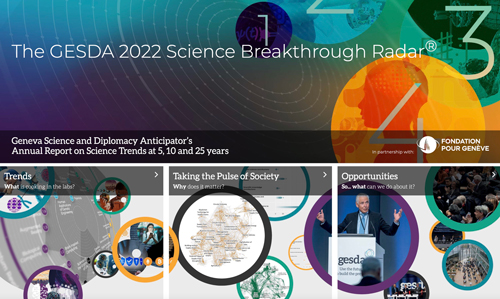These deep dives provide a detailed exploration of three important topics related to human agency at a time when recent breakthroughs in Artificial Intelligence, ideological fragmentation between nations and accelerating climate change raise questions about what it means to be human, how we can all live together in society and how we can ensure the well-being of humankind and the sustainable future of our planet. Year on year, it is becoming ever more important to anticipate future breakthroughs and emerging trends in all areas of science, including natural, social and engineering sciences as well as the humanities and philosophy. This knowledge and understanding can then be used to nurture and broker honest debates between scientists, diplomats, citizens, philanthropists and the private sector, in order to steer humanity towards the most desirable outcomes.
New to the 2023 edition of the GESDA Science Breakthrough Radar®:
- The expansion of the Radar scientific community to 1,542 contributors since 2021, including 58 lead authors and scientific moderators, 265 workshop participants and 525 survey respondents.
- An increase in the number of emerging science and technology topics from 37 in 2022 to 42 in 2023.
- An in-depth scientific deep dive on the future of neuroaugmentation, the result of a GESDA symposium of world-leading experts convened in Villars in 2023.
Three expanded lenses through which to consider the anticipated breakthroughs and trends within the Radar:
The Philosophical Lens: The Future of People, Society and the Planet(s) An update of previous work on the three fundamental GESDA questions by a collective of 18 leading philosophers.
The Geopolitical Lens: The Future of Peace and War The outcome of two workshops held in Geneva and New York in collaboration with the Geneva Centre for Security Policy (GCSP) and the School of International and Public Affairs (SIPA) at Columbia University.
The Science Lens: The Human Right to Science The result of a three-day GESDA symposium at Fondation Brocher in Geneva.
- The development of the Actions and Debates section of the Radar into a full, in-depth analysis of mainstream and social media to take the pulse of society across all topics covered in the 2023 Radar, and its evolution since the creation of the radar.
- An exclusive presentation of the one-year Incubation Phase Report of the Open Quantum Institute (OQI), GESDA's most advanced Solution Idea, in the Opportunities chapter of the Radar.
- A summary of the GESDA 2022 Summit proceedings into the Opportunities section of the Radar.
Taking the Pulse of Science: Our core approach to anticipating scientific breakthroughs
Our core approach to anticipating scientific breakthroughs remains the same: based on the inputs of the Academic Forum and with the high-level guidance of the Advisory Board, we collate the opinions of researchers working in key emerging areas of science through targeted interviews, high-level workshops and a global survey. From their input, the academic moderators — top scientists acting as curators in their respective fields of expertise and members of the GESDA Academic Forum — select the topics with the highest potential implications for people, society and the planet.
These are then presented in the GESDA Science Breakthrough Radar® as carefully vetted, scientifically peer-reviewed anticipatory Breakthrough Briefs. The Briefs analyse the key developments in the selected emerging topics, and anticipate how these topics will evolve in 5, 10 and 25 years.
Using the GESDA Science Breakthrough Radar®
Each of the briefs on emerging topics in the Trends section of the Radar — Taking the Pulse of Science — provides a reliable overview of the status of science and technology in relation to that topic for an interested but non-specialist audience. These briefs are also freely available via the GESDA Science Breakthrough Radar® online platform at https://radar.gesda.global, where they are enriched with key references from the scientific literature and landmark reports.
We have explored three lenses through which the anticipated breakthroughs in the Radar may be interpreted. These are:
- The Philosophical Lens: The Future of People, Society and the Planet(s)
- The Geopolitical Lens: The Future of Peace and War
- The Science Lens: The Human Right to Science
For each of these lenses, scientists, social scientists, philosophers and political practitioners take the Trends described in the Radar as a basis and provide an analysis on how these advancements may shape the future of philosophy, geopolitics, and science.
Moving beyond science and research, the Actions and Debates section of the Radar — Taking the Pulse of Society — analyses mainstream and social media to assess public opinion, sentiment and actions with respect to the emerging topics described in the Trends section. Using this data, we can visualise how sentiment and action around each topic is taking shape and changing, providing insights into society’s interests and priorities for the future.
Our Opportunities section — Taking the Pulse of Diplomacy — consolidates the information from the Trends and Actions and Debates sections to identify opportunities for multilateral action. It provides a high-level analysis of the main outcomes of the yearly high-level Geneva Science and Diplomacy Anticipation Summit, showcasing how leaders from science, diplomacy, impact and citizen communities consider the implication of the emerging topics presented in the Radar. Finally, the Open Quantum Institute incubation report illustrates how GESDA’s anticipatory methodology results in concrete initiatives for the common good.

